Last Updated on May 29, 2025 by Ewen Finser
Selling a business is a big deal. It doesn’t matter whether you’re aiming for a quick $10,000 or less deal or a life-changing $10 million plus sale, you’ve worked hard to turn an idea into an asset you can sell for cold hard cash.
If you’re considering selling your business, chances are you’ve heard of Acquire but that doesn’t mean the platform is necessarily your best option.
The platform that makes the most sense for you and your business depends on several factors:
- How much you want (and can realistically get) for your business
- How much can you afford to spend selling it (in fees, etc.)
- How soon you want to sell
- How much time you have to dedicate to the process of selling (because this is a process, and it takes time, and for that reason, you might want help to make this easier)
- Whether you want to go DIY or prefer everything is done for you (DFY)
- And the trade-off you’ll pay for the convenience of someone doing all of this for you
As with many things in business, this is a time, money, and skills trade-off, and generally speaking, the higher-value a sale you are aiming for, the easier/more cost-effective it is for a trusted advisor to handle everything.
With that in mind, let’s take a look at Acquire and 6 alternatives.
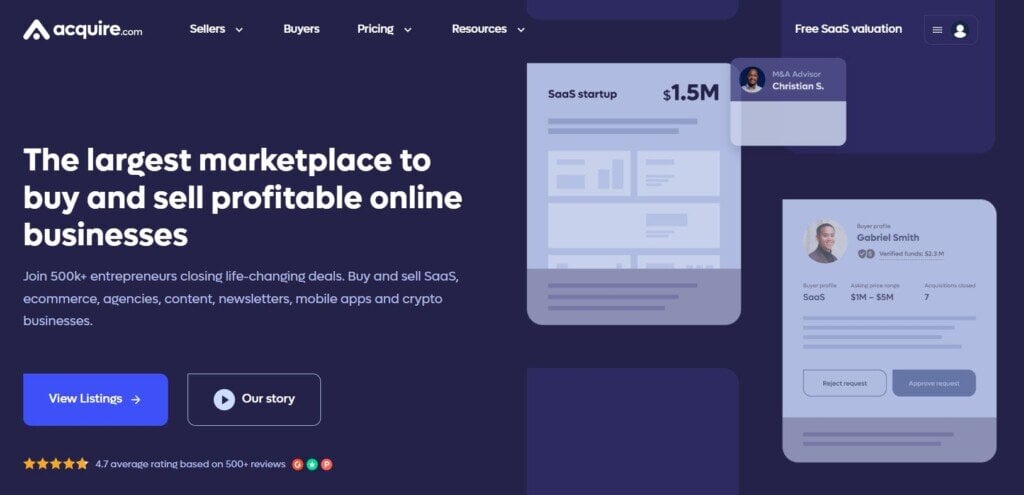
What is Acquire, and Should You Consider Using Acquire for Selling Your Business?
Since it was launched, Acquire.com (previously known as Microacquire) has targeted SaaS founders. However, recently they’ve expanded their pitch to include any category of online business, including ecommerce, content, agencies, mobile apps, newsletters, and crypto businesses.
With 20 years of M&A experience, they boast some impressive metrics, with over $500 million in total deals closed from 2,000 transactions, which gives founders on the platform an average deal value of $250,000.
Acquire promises a done-for-you (DFY), AI-assisted process, so they manage every aspect of the listing and sale. However, the downside of this is that it will cost you. For the full-service plan, assuming you’re listing in the $1 million+ range, fees are going to be roughly $70,000.
Other downsides of Acquire include disagreements over valuations. If they don’t think your business is worth what you think, then they may not list. Also, they rely on an outdated escrow tool, and that can delay and slow down the final stage of the process: Getting your money.
With that in mind, if you’re looking for an Acquire alternative, here are 6 options.
6 Acquire Alternatives
1. Quiet Light

Quiet Light is a founder-friendly brokerage made up of seasoned entrepreneurs who’ve successfully built and sold businesses themselves.
The Quiet Light broker team handles the full sales process for sellers who want expert support from people who’ve been in their shoes.
With a strong network of vetted buyers and a focus on relationships and process, Quiet Light claims that 85% of deals close within 90 days — a far more grounded estimate than platforms like Motion Invest, which tout ultra-fast 12-day turnarounds.
One key distinction with Quiet Light is that they won’t just list your business — whether it’s a SaaS company, content site, or YouTube channel — unless it’s truly ready for the market and matches current buyer demand. If your business isn’t sale-ready yet, they’ll tell you — but that doesn’t mean it never will be.
It just means there’s work to do before the timing is right. You will usually get guidance on what’s needed to make it ready to sell, so you can focus on those tasks next. This is refreshing compared to platforms that will do whatever they can to get a listing, even if they aren’t confident a business is going to sell.
For founders whose businesses are deemed sale-ready, Quiet Light runs a comprehensive vetting process before going live. From there, their team helps guide every part of the journey — including due diligence, negotiation, and buyer engagement — to make the transaction as smooth and successful as possible.
2. Flippa
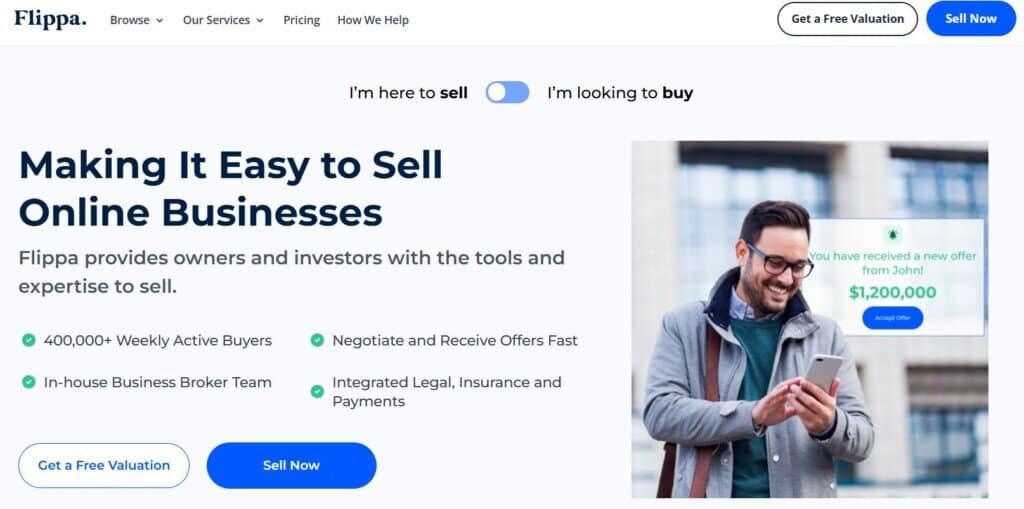
Flippa is one of the most established platforms in the digital M&A space, boasting a large and active network of over 3 million users and 450,000 active buyers and sellers.
Since its launch in 2009, it’s enabled more than 100,000 business sales — a scale that surpasses niche players like Acquire.
The platform caters to a wide spectrum of online assets, including websites, eCommerce stores, newsletters, YouTube channels, and even AI-powered or SaaS businesses. However, Flippa doesn’t provide publicly available benchmarks for average deal size or multiples, which can make valuation comparisons more difficult.
Flippa isn’t always a cost-effective choice for sellers, particularly at the higher end. For example, if you’re working with a Flippa M&A advisor on a $1M+ listing, fees can add up to around $85,000 across a typical 6-month sale window — and that includes success fees.
3. Investors Club
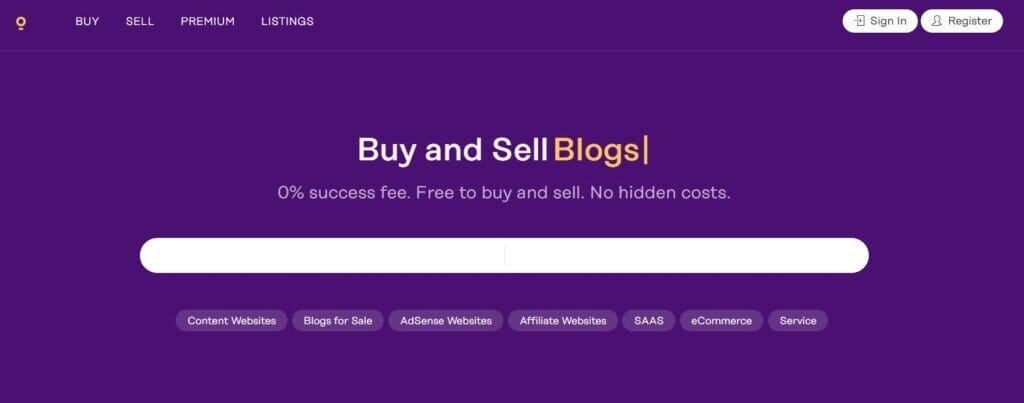
Investors Club positions itself as a curated, low-cost M&A marketplace that primarily handles smaller M&A deals — typically sub-six-figure transactions, though seven-figure listings do appear from time to time.
The platform differentiates itself by eliminating both listing and success fees, a strategy that helps keep selling costs down compared to the more expensive platforms.
The no-fee structure is appealing, but it does come with trade-offs. By lowering the barrier to entry, Investors Club tends to attract more unqualified buyers and casual browsers — potentially increasing the amount of time spent weeding out tire-kickers before a serious offer comes in.
However, if you want more visibility or support, there is a DFY service, with post-exit success fees between 5% and 20% (depending on the price your company sells for).
4. Motion Invest
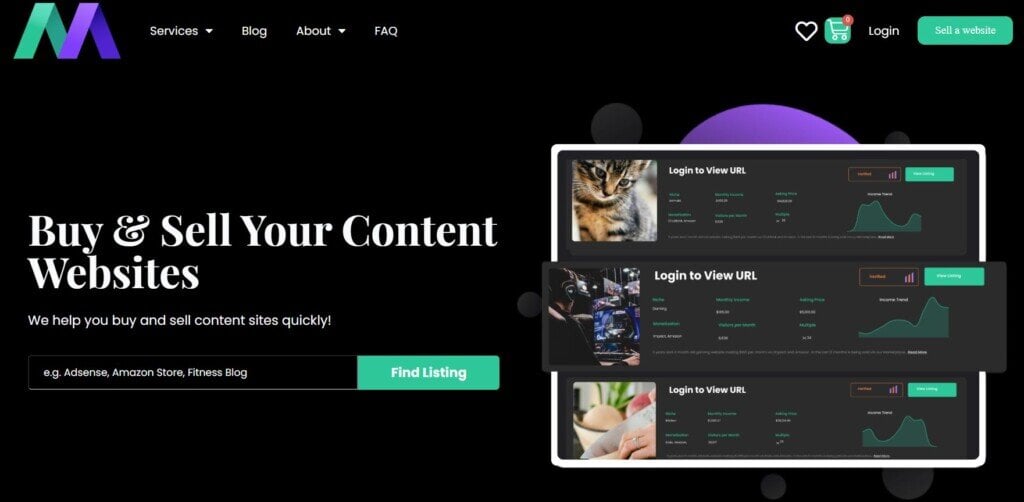
Motion Invest started out as a place to sell niche content websites, but has since expanded to include assets like YouTube channels as well. The platform is relatively young — founded in 2019 — and reports 1,587 successful deals with a claimed 97% success rate. The average sale multiple currently sits at 32X.
There’s no fee to list your business, but if you close a deal, you’ll pay a success fee that scales by sale price:
- Under $20K: 20%
- $20K–$50K: 15%
- $50K–$100K: 12.5%
- $100K–$500K: 10%
- $500K–$1M: 5%
- $1M+: 2.5%
Sellers have two options: list on the marketplace with a 30-day exclusivity lock (where most websites/channels reportedly sell in just 12 days), or see if Motion Invest wants to purchase your business themselves — which could mean cash in hand within 72 hours of due diligence wrapping up.
While these claims sound promising, they require scrutiny and a little skepticism. A 12-day turnaround and a 32X multiple raise questions — especially when financial documentation, business plans, or securing an SBA loan can take months.
Most listings are under $10K, which helps explain the rapid sale cycles and higher commission percentages.
Motion Invest also uses a Dutch auction process, where the price starts high and keeps dropping until someone bids. Also, the 32X multiple may only apply to marketplace sales, not direct purchases — but this isn’t made explicitly clear.
5. FE International
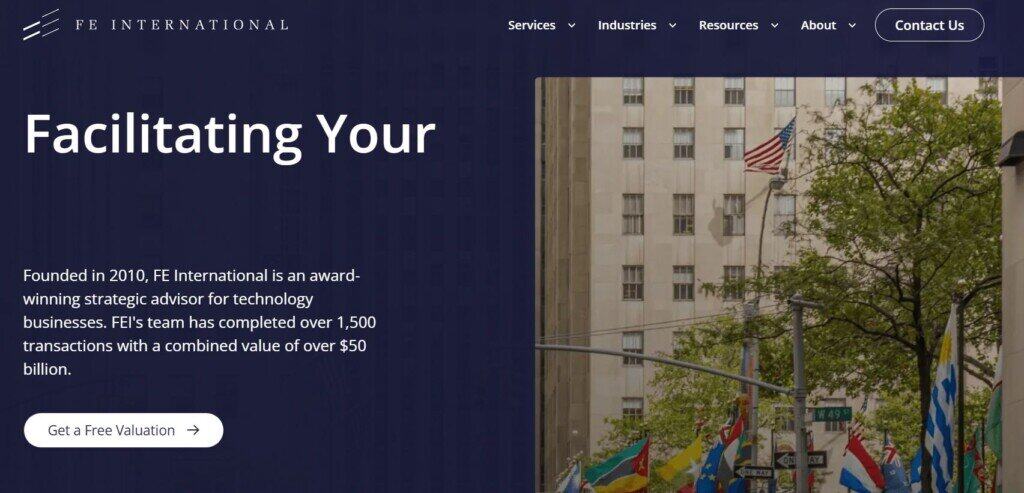
FE International is a long-standing and reputable platform, known for specializing in the sale of tech companies. Since 2010, the firm claims to have closed over 1,500 deals totaling $50 billion — though this figure includes a wider set of services beyond just M&A, such as stock and bond transactions via its licensed investment arm, FE Capital Markets LLC.
Because that figure includes a wider range of transactions, it’s difficult to know how many businesses FE International has actually helped to sell. Or the average deal size.
FE International operates more like a boutique M&A/investor advisory firm than a typical listing platform. With a 94% success rate, it’s safe to assume that the team only takes on businesses they believe they can close. You won’t be able to browse listings without being pre-qualified as a buyer, which adds a layer of exclusivity but limits visibility.
While FE’s in-house experts (including CPAs and CFAs) handle much of the transactional heavy lifting, pricing isn’t disclosed upfront. Given the white-glove approach, it’s reasonable to assume both the cost and the process timeline are on the higher end — and that may not work for startup founders who want a quick sale and to not pay a fortune for it.
6. BusinessesForSale.com
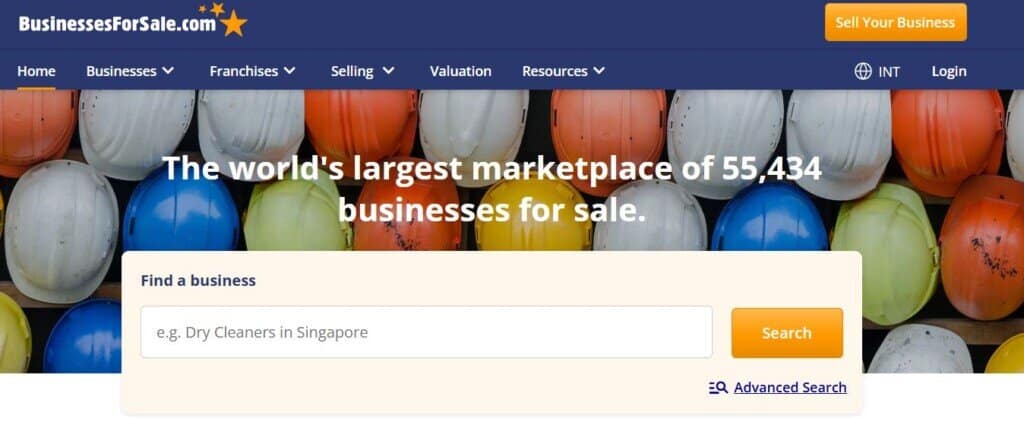
As you can guess by the very SEO-friendly name, BusinessesForSale.com has been around since the mid-90s. It boasts 53,000 listings across more than 130 countries.
The platform accommodates a wide array of business types — from local franchises and property portfolios to niche ventures like vineyards or private islands. However, that diversity could be a drawback if you’re hoping to connect with a more targeted group of tech-savvy or online business buyers.
Pricing is highly competitive. You can list a business for free for 20 days, and afterward choose a paid package ranging from $199 to $399 for 1, 3, or 6 months of exposure. But keep in mind that BusinessesForSale.com is essentially a listing board — it doesn’t offer built-in brokerage or support services like many more modern alternatives.
If you’re selling a SaaS startup, eCommerce store, or any other digital-first business, this may not be the best fit. This platform is geared toward traditional small businesses.
Key Takeaways: Which is the best Acquire alternative?
Out of these options, if you want full-service, honesty, transparency, and vetted buyers, then Quiet Light is looking the best for founders.
Motion Invest could be good if you’ve got a small content site or YouTube channel and want a quick sale. Whereas those aiming for 7-figures or more may want to go with FE International.
However, for most of us in the 5 to 6-figure range, full-service is usually preferable to DIY/Pay-to-play listings like many of the platforms, such as Aquire and Flippa, which brings me back to Quiet Light as the best Aquire alternative.

